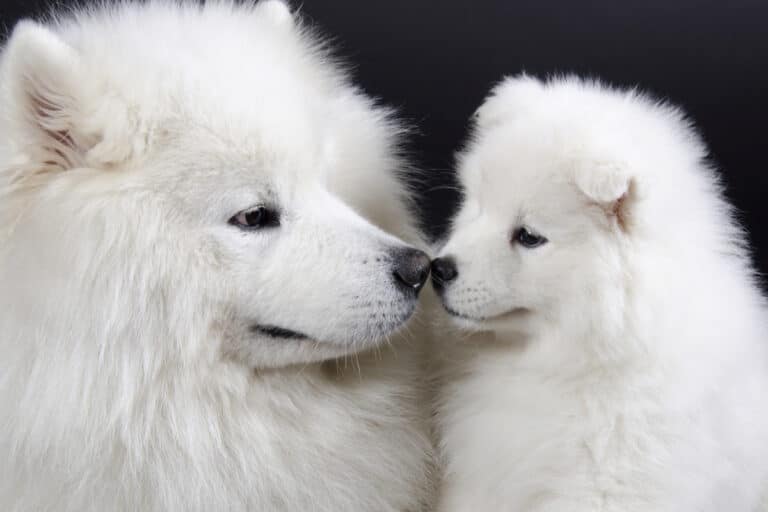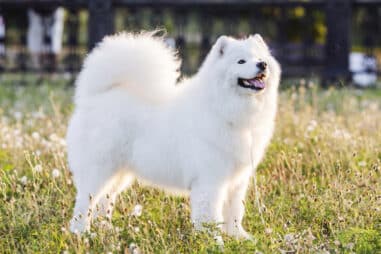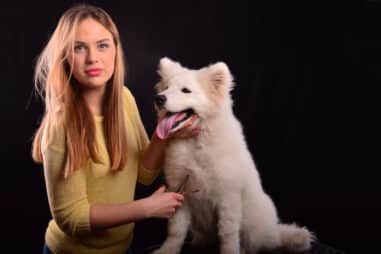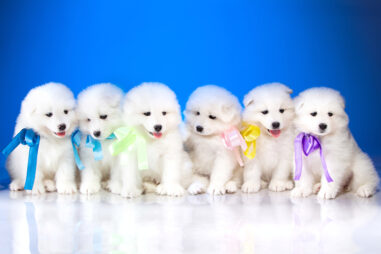The Samoyed is a beautiful canine breed, but the sheer size of this medium-size build of dog is sometimes a cause for concern to some people. Due to their immense size, potential buyers of Samoyed puppies often second-guess their decision.
This aspect can be a problem area, particularly for those who live in tiny apartments. It is also a matter of concern for those who live in tiny homes with limited space.
Whether you prefer a smaller canine companion, you may have wondered if miniature Samoyeds exist. And yes, there exist miniature Samoyeds. This type of Samoyed is the breed’s smaller or “miniaturized” version. They have the same predispositions, mannerisms, and features as full-sized Sammies.
Like everything else, caution should precede any decision to buy a puppy of this kind. You may need to vet the breeder or the canine organization from which you are buying/acquiring the miniature Samoyed dog.
Often, miniaturized dogs are not purebred, leading to health problems. Since they are not genetically modified, the Samoyed breed should be one of the healthiest canine breeds.
Is There Such Thing as a Miniature Samoyed?
Miniature Samoyeds are real dogs. They exist! But, compared to the standard Sammy, they are not few and far between. In other words, it is far easier to find and buy a mini Samoyed than their bigger counterparts.
This is the explanation. Unscrupulous breeders are trying to create more Samoyed puppies that are smaller to gain a marketing advantage. They will be able to make more money if they do this.
If breeders decide to breed more standard Samoyed, since they are medium-size dogs, some buyers will find their sheer size a matter of concern. This is a problem area for people living in apartments. It is also an issue for puppy buyers with limited space in their homes.
Samoyed buyers sometimes can’t afford to have a dog of medium build. Hence, they would prefer a small-scale version of the breed if available.
These shady breeders knew there was a good market and high demand for the toy version of the Samoyed breed. Most of the time, they have a good mastery of the art of canine breeding. So they knew exactly how to produce a smaller version.
But major dog organizations in the US do not recognize such miniaturized lines. They don’t acknowledge the miniature Samoyed. And this applies not just to the Sammies but to poodles, Pomeranians, Japanese spitzes, and many others.
Major canine organizations would deny registration for these pups as a pure breed line. They don’t encourage unethical breeding practices because those can compromise the quality of the breed. In addition, those will also put the litter’s health on the line.
The reason why miniature versions of different canine groups proliferate in the market is that they sell faster. But if you try to look for a standard Sammy, chances are you will have a hard time finding a dedicated breeder for this group.
Seldom will you find a reputable breeder offering such kinds of puppies. It is because most mini Sammies are not pure Samoyed lines but hybrids. And only a few people are aware of this.
What Is a Miniature Samoyed Called?
When it comes to selling their pups, breeders of miniature Samoyeds are as inventive as any other enterprising people.
The words “little Samoyed,” “small Samoyed,” and “teacup Samoyed” were all coined and used for this purpose. These words are the marketing terminologies they use. Thus, they are essential to their business because they help attract new customers. These terminologies help pique their prospective buyers’ curiosity and encourage them to visit their kennel.
Occasionally, you may run into breeders selling “puppet Sammies” or “minion Sammies.” Please don’t allow yourself to get tricked by these new words they use. Be aware that these are nothing but updated versions of their marketing jargon.
They do this to add more flavor to their ads and spark interest in them to encourage buyer interest. They are nothing but the same in meaning as the “miniature” and “teacup” adjectives they use to describe the size of their miniaturized Samoyed. For that matter, they may also use these terms to describe other canine breeds they have miniaturized.
The same applies to dogs that some breeders classify as “toy breeds.” These dogs are also nothing but the miniaturized versions of a standard-size dog. You can legally have any breed termed a “teacup dog breed” because teacup dog breeds weigh less than the AKC criteria for a toy breed.
According to most breeders, a teacup or a miniature dog is smaller than 4 pounds (2 kgs) in weight and less than 17 inches (43 cm) tall. From these criteria, there are only six authentic teacup breeds.
What Is a Teacup Samoyed?
Teacup Samoyed dogs are miniaturized versions of the standard Sammy dogs. These dogs are much smaller in stature, and because of this, they fetch a higher selling price on the pet market. A teacup dog often doesn’t weigh more than 5 pounds or 2 kgs. Hence, their size.
The ‘runts’ of litters are mated or partnered together to create the tiniest Samoyeds possible. Sometimes, they are crossbred to another smaller canine group such as Pomeranian or Poodle. Such unions will create “teacup” or mini Samoyeds with all their glorious features.
In some instances, hereditary disabilities cause the dogs chosen for this type of breeding to be too small. They may also have medical issues from time to time. Thus, these resulting miniature Samoyeds may have significant health issues, too.
This is because they are formed not from natural breeding but from something unconventional. Breeders only use this unethical breeding method to get a competitive marketing advantage.
What Dog Breeds Originally Belong to the Authentic Teacup Line?
Many websites and articles are dedicated to teacup dog breeds, how they are a pet, diet, maintenance, and many more. Keep in mind that only six dog breeds belong to the line of authentic teacup dogs. Other so-called teacup breeds are purely the product of the miniaturization efforts of some breeders.
Teacup Maltese
Teacup Maltese are less common, yet these dogs do an excellent job as guard dogs due to their intense dislike of strangers.
Teacup Maltese dogs, on the other hand, may need the training to manage their loudness and barking. The sweet and attentive nature of the teacup Maltese dog breed is also among the reasons why they are well-known and sought after by dog lovers.
These dogs are sensitive canines who need encouragement rather than fussing. They are full of energy and enjoy frolicking. It is an excellent breed for families with school-aged children.
Teacup Pomeranian
Teacup Pomeranian dogs are another type of canine breed that may necessitate anti-bark training. In addition, they are highly attentive and interested in their surroundings.
Even though they are one of the most well-known varieties of teacup dogs, they won’t hold back when there is a problem.
Teacup Pomeranians can easily flourish in a laid-back environment. This is because they are less energetic and less playful than standard Pomeranians. Like all teacup dog breeds, you keep these dogs in homes with adults and older children.
And lastly, these dogs are often considered one of the best dog breeds for ladies. They make excellent handbag dogs for them because they contrast entirely with loud dogs.
Compared to the standard line, this type of Pomeranian is not very vocal.
Teacup Yorkie
Along with Chihuahuas, the Teacup Yorkie is such a well-liked dog breed. The Yorkie is a bold, self-assured dog. Plus, in addition to that, they have a wide range of personalities. These dogs are also affectionate and accommodating, except for kids and smaller animals.
In the case of teacup Yorkies, this miniaturized version of the breed has a certain level of aversion toward smaller animals.
It doesn’t matter if you live in an apartment or a house with a yard; these dogs are adaptable to any setting. It’s essential to give your Yorkshire Terrier plenty of time to go about and get some exercise.
Additionally, they will need instruction in bark-control methods. As a result, a dog owner who can devote themselves to their pet is the best match.
Teacup Poodle
Poodles are among the most intelligent dog breeds ever created in terms of intelligence. They range in size from teacups, and toys to giants, regardless of their size. They are very adaptable and fit in well with any home or household.
This breed is best suited for first-time dog owners looking for a well-behaved pet. Teacup Poodles have only one disadvantage. These dogs need frequent grooming by a professional.
Additionally, they have all the disadvantages that come with being a small dog breed. This includes being delicate and may suffer from a wide range of health conditions typical of extra small or miniature canines.
Teacup Chihuahua
These days, Chihuahuas are one of the most popular teacup dogs. Despite their cuteness, teacup Chihuahuas are also among the most anxious breeds. The cats seem to like them, but other dogs and young children do not.
One of the most popular breeds of teacup dogs nowadays is the Chihuahua. They are also one of the most anxious breeds, which is why they are so popular. They can quickly get along well with cats but may not like the company of kids or other dogs.
This is the puppy purse dog. They dislike being alone and are extremely affectionate. Despite being intelligent and easy to train, these dogs require much care and attention and make good apartment dogs.
Teacup Shi Tzu
The Teacup Shih Tzu is the final authentic Teacup dog breed. This breed is ideal if you want a little dog who can wear bows in his hair. The Teacup Shih Tzu has a lovely, lengthy coat that owners enjoy styling in various ways. They are among the prettiest dogs in existence, which is why they are always in high demand and frequently adopted.
These dogs typically exhibit low levels of energy and little urge to bark. They are ideal for people who are living in apartments or flats. In stark contrast to most of the Teacup dog breeds on our list, these little puppies are also excellent with children and other animals.
How Big Are Teacup Samoyeds?
A teacup Samoyed is a miniature version of the standard. The height and the weight of adult and male miniature Samoyeds may vary anywhere from 21.5 to 23.5 inches (55 to 60 cm).
The female mini Samoyed typically stands between 19 and 21 inches (48 and 53 cm) tall and weighs between 35 and 50 pounds (16 and 23 kgs ).
It is vital to bear in mind that the sizes mentioned above are only an estimate of the typical length of a female or male mini Samoyed. The size of these dogs may vary with respect to different variables, such as the puppy’s age and health.
What Dog Breeds Are Smaller Than Toy and Teacup Dogs?
These miniature dog breeds are often associated with teacup canines. However, the American Kennel Club does not acknowledge these dog breeds as authentic teacup dogs.
Furthermore, the following pups are much smaller than toy canine breeds.
Miniature Dachshund
The miniature Dachshund is a small dog, but one that is bold and brave despite its size. These dogs are very energetic and love to play.
Offer them health-promoting dog food formulated for Dachshunds, and they become incredibly healthy. But, it is essential to note that this breed is not usually very friendly or accommodating to kids or other animals.
Despite their shy nature, miniature Dachshunds make excellent watchdogs. Their long backs make them prone to many illnesses, and they shouldn’t live in an environment where they have to climb stairs a lot.
Miniature Labrador
Because they are considerably bigger than other small breeds, the Miniature Labrador is not widely known. They are loud and enthusiastic hunting dogs. This “small” breed is not as delicate as other toy dogs because it is still relatively large.
But when you potty train a miniature Labrador, you can say that it is a cinch with these dogs.
Labrador Retrievers of this kind are popular with families that enjoy the great outdoors. These canines can handle extremes of temperature and require a lot of physical activity.
Although they are not technically designed for apartment life, many dog owners nonetheless choose to adopt them.
Miniature Schnauzer
This isn’t a squishy type of dog. Being alone isn’t a problem for Miniature Schnauzers. They’re also hardier to temperature extremes than any other breeds on this list. These are ideal pets for people who are always on the go.
They are among the most obstinate dogs, nonetheless, due to their high level of independence. Because of this, they need a capable and knowledgeable dog trainer. These dogs need daily walks and challenging dog toys to keep their high energy levels from turning to destructive behavior.
They have a longer life expectancy, just like the majority of other Miniature dog breeds and small dogs in general.
Teacup Brussels Griffon
Most dog owners will find the Teacup Brussels Griffon as an ideal companion. Children and other dogs will have no problem getting along with these dogs. As a whole, they are a bright and cheerful bunch.
All teacup dog breeds need continual supervision, but this is one of the more vulnerable. They despise being left on their own, to say the least. Problematic habits like whining and chewing may emerge if you often leave them alone.
Teacup Pekingese
Often referred to as “the princess” of small dogs, Teacup Pekingese are no exception to this rule. No matter how little or how well-behaved they are, Teacup Pekingese don’t like living with other pets or kids.
Low-calorie, low-intensity lifestyles are ideal for these dogs. This makes them suitable for those who are living in a small flat. These adorable little fur babies need a skilled trainer and an owner who can devote enough time and care to them.
Teacup Fox Terrier
Standard Fox Terriers have a more excitable temperament but are not as quiet as Teacup Fox Terriers. These dogs may need a lot of physical activity to keep up with their quick and active dispositions.
Like all the greatest teacup dog breeds on this list, this one is vulnerable to serious injury and is quite delicate. With adults, the foxie can be quite affectionate. But it is a different story when it comes to kids and other pets. These dogs often wish they don’t have company.
Miniature Collie
Miniature Collies are friendly, clever, and trainable dogs, making them one of the most attractive teacup dog breeds. A family with an active lifestyle will appreciate their agility and athleticism. They are also great with children and other animals.
Miniature Collies have long coats that shed, so ensure you have the time and energy to keep up with the shedding. These dogs need frequent brushing and trimming to keep mats and tangles at bay. And they are known as among the most expensive dogs to get and maintain.
Furthermore, they are well-known for not being bothersome canines and not barking all the time.
Teacup Boston Terrier
The Teacup Boston Terrier is one breed that requires the least amount of upkeep because they have short hair. These dogs also shed, albeit minimal. These smaller varieties need a stable, mild environment to be happy and stay active.
As for their bigger counterparts, they can effectively handle sudden temperature swings.
Teacup Boston Terriers are strong, energetic, and playful tiny dogs. They get along nicely with children and pets. While seeming robust, teacup dogs are more fragile than typical small breeds. They can easily get hurt without exerting much effort.
Teacup Beagle
Children and other animals get along nicely with the Teacup Beagle breed. Since Teacup Beagles are akin to ordinary Beagles, one of the best hunting dogs, they still have hunting instincts.
You can train them how to stop barking and pursuing other animals. This breed’s puppies have a lot of energy and life.
All Beagles need to be closely watched to prevent them from becoming destructive. Training these dogs can be a bit of a challenge. Despite all that, they remain one of the most well-liked teacup dog breeds. This is due to their endearing personality, adorable looks, and sunny disposition.
If they receive the proper Beagle diet and exercise, they may also live long lives.
Do Mini Samoyeds Shed?
Although Samoyeds of all sizes shed quite a bit, the small Samoyed variety shed less hair than its full-sized Samoyed counterpart.
Miniature or teacup Samoyeds are known to shed throughout the year, but the worst time comes when they get into their “coat blow” season. Technically, this is called the “molting period” for canines, and usually, this will take place during spring and fall.
With the changing seasons, mini Samoyeds shed a good amount of their inner coats. This is how their body would prepare itself for the onset of a new season; it shouldn’t cause an alarm.
Are Teacup Samoyeds Hypoallergenic?
Despite their tendency to shed heavily, experts consider miniature Samoyeds hypoallergenic canines. It is because they tend to produce a negligible amount of dander. Animal dander is the material that’s causing allergies in those who are vulnerable to it.
These particles can spread from the dog’s coat to nearby surroundings because they can become airborne. An allergic response will follow when they penetrate a person’s mucous membranes through the nose and lungs.
But, the amount of dander a mini Samoyed may produce is minimal. It may not be enough to cause or trigger an allergic response. As a result, those who are allergic to animal dander have a better chance of escaping suffering from their allergies if they have this dog.
Miniature Samoyeds are best for those who want to own a dog but can’t afford to have one because they have allergies.
Why Do Some People Have Dog Allergies?
A dog’s skin releases proteins that usually end up in their dead skin or dander, saliva, and urine. If a person happens to have a sensitive immune system, their body may develop an adverse reaction to these proteins. This is known as an “allergic response.”
Different canine groups create different amounts of dander. Thus some people may be more allergic to certain dog breeds than others.
The allergen is absorbed into the fur of the animal over time. It then becomes lodged in the padding of couches, carpets, clothes, and walls. To correct this general notion, it’s not the dog’s hair per se that causes allergies but the dust and dander it might trap and carry.
Animal dander from pets may also linger in the air for extended periods. At some point, they can get through a person’s eyes or infiltrate the individual’s respiratory system.
How Much Does a Miniature Samoyed Cost?
You can expect to pay between $600 and $1,500 for a healthy miniature Samoyed from a nonexotic bloodline.
Samoyed puppies are pretty expensive wherever you go in the world. So, be prepared to spend at least $1,000 if you are seriously looking forward to owning one.
A top-notch miniature Samoyed, however, is much more expensive than the standard size. They may command a whopping amount of $3,000 or even more. This is especially true if the puppy hails from a champion bloodline, bred by AKC-certified breeders.
Having such a pedigree means that the puppy belongs to an award-winning line.
Simply put, they belong to the top tier class for this breed. But since AKC does not recognize miniature or teacup Samoyed as a purebred line, they may not come with any registration papers.
If you can’t get a regular-sized Samoyed, you can always look for or adopt a miniature version of the breed. There may be a cost of up to $150 to adopt a dog from a shelter. Often this amount will include the cost of the puppy’s comprehensive health check.
In addition, you may proactively ask for help to spay/neuter the puppy you want to have if you’d like.
Many factors, including but not limited to age, coat color, gender, and breeding methods, determine the cost of a Samoyed pup. This applies to the standard size and the miniature versions of the breed. Their cost might vary depending on where you live.
If there is a market for little Samoyeds in your region, the price will continue to go up. If you wish to get a teacup Samoyed puppy from another country, the travel fee will mark up the price.
Miniature Samoyed vs. Samoyed?
The size is the first visible difference between an undersized and regular Samoyed. A standard Samoyed can reach a height of 23 inches (58 cm), but a mini Samoyed can only reach a height of 15 or 16 inches (38 or 40 cm).
Sammies at standard size may weigh up to 65 pounds (30 kg). In the case of a healthy teacup Samoyed, they should not weigh more than 30 to 35 pounds (14 to 16 kgs).
They have the same temperament but with varying degrees of physical strength. A well-trained Samoyed may travel more than 100 miles (161 km) daily, but a miniature Sammy is unlikely to go more than 10 to 30 miles (16 to 48 km).
Lastly, anyone looking to buy a Samoyed should visit several breeders dedicated to this breed before settling on one. By doing a kennel visit, they’ll have a first-hand look at Samoyed litters and learn about the mother–offspring dynamics.
Why You Should Veer Away From Miniature Samoyed
Miniature Samoyed “exist” due to unscrupulous breeders who want to sell this kind of pup to unsuspecting buyers. This is an effective way for them to generate more money from the breed, considering the fact that Sammies are among the most uncommon. By producing miniature versions of this line, they can hop in on the high demand for these dogs and thus earn more.
If you come across someone offering mini Samoyed, take caution. It should raise a red flag for you. Neither the American Kennel Club nor the Continental Kennel Club recognizes miniature Samoyeds.
Those shady breeders who market and sell these types of pups would have mixed purebred Samoyeds with another canine group. That is how they create a mini version of a dog line, more or less.
For example, you can crossbreed the Pomeranian or a Japanese Spitz dog with a runt Samoyed. The resulting litter from such unions will produce smaller puppies. Often, the puppies produced would take on the appearance and features of the Samoyed line. But as far as their pedigree is concerned, they are not purebred.
Those unscrupulous breeders only have one thing in mind, to generate more money from their trade. Since there is a high possibility that mini Samoyeds are a hybrid, it is better to opt for the real deal and look for a standard Sammy instead.
When looking for a standard Samoyed puppy, it is crucial to keep these points in mind, so you get the most value for your money:
Standard Sammies are generally medium in size. The average male weighs 45 to 65 pounds (20 to 30 kgs), and the average female weighs 35 to 50 pounds (16 to 23 kgs). There are outliers on both ends of the range, so you may find a Samoyed that is somewhat bigger or smaller than the norm, but these are the exceptions.
Why a Miniature Samoyed Is a Worrisome Breed
Unbeknownst to many, most mini Samoyeds are more prone to developing a variety of health concerns as they age. These dogs often emerge from commercial dog breeding facilities and puppy mills, and an awful lot of them are in bad condition. Thus, they are not very conducive to breeding dogs of any kind.
The state of squalor these puppy mills operate in is often cited as one of the reasons why the bulk of the pups they produce are of inferior quality. Meaning to say, the puppies they sell in the local pet market often have health issues.
So, it is not only because they are a hybrid of the runt Samoyed, but the exact condition of the breeding facility itself is a major contributing factor.
Yet, despite the poor condition and low maintenance these breeding facilities have, they can still create any breed they like. Many people may not realize that these breeding facilities are entirely legal to operate in the country.
Unfortunately, no law or legal measures have yet been put in place to regulate or monitor this sector.
So, potential buyers looking for mini Samoyed or teacup Sammies should take serious caution when searching for a breeder. They should only do business with a trustworthy kennel for their own good and to get only quality breeds.








